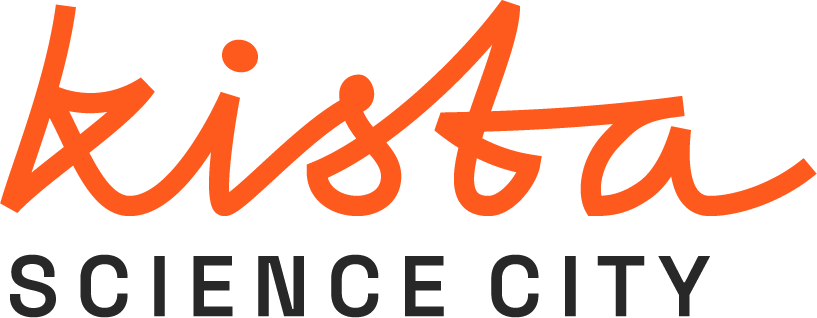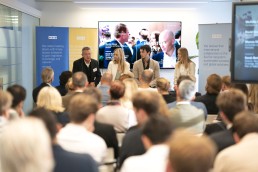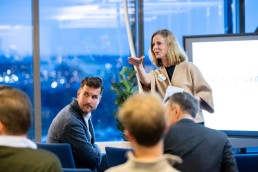Eight Swedish scaleups head to Munich for Access Germany
The internationalisation of Swedish innovation continues. This week, we bring eight scaleups to Munich for Access Germany — a market entry programme organised by Kista Science City and the German-Swedish Chamber of Commerce.
From 29 September to 1 October, these companies will meet potential customers, investors and industry leaders, and gain insight into one of Europe’s largest and most innovative tech ecosystems.
Meet the companies
The selected scaleups represent sectors ranging from climate tech and automotive software to advanced materials.
We welcome:
- Remotive Labs: Helps automotive teams build, test, and iterate vehicle software at speed.
- Manomotion: Enables machines and devices to be controlled using simple hand movements.
- Nobula 3D: Develops the world’s first affordable 3D printer for glass.
- Cellufy: Offers a sustainable, bio-based alternative to plastic for packaging and products.
- Mediaflow: A platform that helps teams securely manage and share digital content.
- MyVox: MEMS technology transforming how sound and active cooling are integrated in compact electronics.
- NitroCapt: Produces fossil-free nitrogen to make fertilizers climate neutral.
- Smartport: Turns parking areas into smart energy hubs with solar, storage and EV charging.
Access Germany: Tailored market entry
The programme is designed to help fast-scaling deep tech, hardware and B2B businesses shorten the path to international growth.
This week, the delegation travels to Munich for three days of meetings, workshops and networking. Scheduled back-to-back with Bitz & Pretzels, a major European startup gathering, the visit creates opportunities to connect with the wider innovation community while focusing on targeted customer and investor engagements.
Throughout the programme, the companies will receive:
- Exclusive meetings with customers, partners and investors
- Insights into navigating the German business landscape
- Workshops to refine messaging and market positioning
“Breaking into new markets is rarely about technology alone,” says Arash Sangari, Programme Manager at Kista Science City. “It’s about being able to explain your value, build trust quickly and meet the right people at the right time. Access Germany is designed to give companies that platform — compressing months of effort into a few intensive days.”
Upcoming programmes
Later this autumn, applications will open for the 2026 Access programmes, targeting the US, Canada, UK and Germany.
Interested in joining future programmes? Contact arash.sangari@kista.com.
—
Access Germany is organised by Kista Science City and the German-Swedish Chamber of Commerce, with funding from the European Union and Region Stockholm.
Opening doors for Swedish tech: Lessons from Access UK
What does it take to turn international ambition into actual market traction? For ten Swedish tech companies, Access UK offered a sharp, three-day answer.
Organised by Kista Science City in collaboration with the Swedish Chamber of Commerce and the British Embassy in Stockholm, the programme brought a selected group of deep tech, climate tech, and connectivity scaleups to London during London Tech Week. The goal: to accelerate UK market entry through high-level meetings, direct insights, and on-the-ground experience.
The result was a tightly focused week of tailored customer meetings, speed networking, panel sessions, and expert briefings — all based in London, but with insights and connections reaching across the UK’s broader innovation landscape.
“The programme delivered what many don’t: real access, honest conversations, and a clear view of both the opportunities and the hurdles ahead,” said James Campion, CEO of TeraSi.
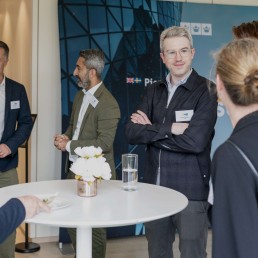
Image Credit: Swedish Chamber of Commerce for the UK
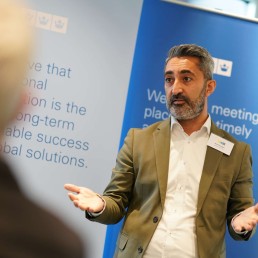
Image Credit: Swedish Chamber of Commerce for the UK
From insight to traction
By the end of the week, several companies had already secured follow-up meetings or opened discussions about potential partnerships. For others, the biggest shift was strategic: clearer positioning, sharper communication, and a stronger understanding of how to move forward.
“There’s a shift you start to notice,” said Arash Sangari, programme manager at Kista Science City. “Participants are still energised, but already thinking ahead — how to bring the learnings home, how to make the UK a real priority. That kind of momentum, from insight to action, is exactly what we’re aiming for.”
Much of that momentum came from the people in the room: investors, journalists, ecosystem leaders, and fellow entrepreneurs. The Access UK programme combined intimate roundtables with media and PR experts (including Sifted), with structured investor matchmaking and exposure at major industry gatherings like the Chamber’s Tech Forum.
And while London was the hub, the UK opportunity is broader. “Cambridge, Manchester, Bristol – the regional ecosystems are alive with talent, capital, and unmet demand,” Campion reflected. “The UK is open for business, and the hangups of Brexit feel like a thing of the past.”
Learning the landscape — and standing out in it
For many participants, the week also brought clarity around what makes the UK market different. Sales cycles, proof points, and partner expectations vary — and local context often matters more than companies anticipate.
“The hardest part isn’t just getting meetings — it’s understanding how business actually works here,” said Sangari. “What kind of traction do you need to convince a buyer? How are relationships built? What are the red flags you didn’t know you were giving off?”
According to Alfred Lindberg of Univrses, part of the value came from going together with other Swedish tech companies. “It gives you weight. Even as a small company, you’re not showing up alone — and that opens doors. Plus, you share more than you think with the other companies. Different fields, same challenges.”
That trust also extends to the Swedish brand. From sustainability to engineering quality, Swedish companies often arrive with a reputation that works in their favour — a legacy built by decades of successful Nordic expansion into the UK. But translating that into deals takes structure, preparation, and credible support.
“It’s easy to underestimate how competitive these markets are,” said Lindberg. “Initiatives like this are a smart way to help Swedish companies hold their ground — especially in strategic fields like AI and infrastructure, where we want to stay globally relevant.”
What’s next?
For Kista Science City and its partners, the work doesn’t stop when the flights land. The team will continue to support this year’s participants as they take next steps — from navigating ongoing UK conversations to preparing for entry into other international markets.
“Part of our role is to make sure companies are prepared before they go,” said Sangari. “But just as important is what happens after — helping companies stay focused, keep up the momentum, and make use of the networks they’ve built.”
Looking ahead, Access UK is one piece of a broader effort to give Swedish tech companies the right conditions to grow internationally — faster, and more strategically. That includes continued collaboration with the British and Swedish embassies, the Chamber, and ecosystem partners like London & Partners.
Global competition isn’t slowing down, and neither should Swedish scaleups.
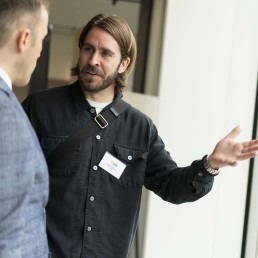
Image Credit: Swedish Chamber of Commerce for the UK
Get involved
Access UK is a market acceleration programme run by Kista Science City in collaboration with the Swedish Chamber of Commerce for the UK and the British Embassy in Stockholm.
This autumn, Access Germany will bring ten Swedish growth companies to Munchen, with new programmes launching in the US and Canada in 2026.
To learn more about upcoming programmes or connect withparticipating companies, reach out to Arash Sangari at arash.sangari@kista.com.
Kista Science City selects ten scaleups for Access UK
The lineup is set! Kista Science City is backing ten cutting-edge Swedish scaleups as they take their next step toward international expansion. Through Access UK, a tailored programme to fast-track UK market entry, these companies will gain the insights, connections, and strategic support needed to scale. In June, they will head to London for three days of high-level meetings with potential customers, investors, and industry experts.
Meet the companies
The selected scaleups bring transformative solutions to a range of industries, from sustainable materials and mobility to IoT and deep tech. Each company has been chosen for its potential to thrive in the UK market and make a lasting impact in its sector.
We welcome:
- Clean Motion: Ultra-light electric vehicles designed for minimal energy consumption in urban transport.
- MyVox: MEMS technology transforming how sound and active cooling are integrated in compact electronics.
- TeraSi: Advanced semiconductor components enabling faster, more stable wireless communication.
- Flic: Wireless buttons simplifying IoT automation and smart home control.
- Proptivity: Future-proofed indoor connectivity solutions with high-performance 5G networks.
- Cemvision: Climate-neutral cement solutions revolutionizing the construction industry.
- Relox Robotics: Autonomous robots optimizing golf ball collection for efficiency and precision.
- Greeniron: Fossil-free metal recycling, reducing emissions in the steel sector.
- Brinja: IoT-driven safety solutions enhancing real-time monitoring on construction sites.
- Univrses: AI-powered computer vision for real-time urban traffic data and smart city development.
For Nicolas Bec, Chief Commercial Officer at Cemvision, Access UK presents an important opportunity to deepen market understanding and build new relationships:
“The UK is a priority market for us, and we took our first step earlier this year through a partnership with EQT Exeter. We see great potential for continued growth, driven by a strong market and new regulations that promote sustainable cement solutions like ours. Access UK will be an important opportunity to deepen our understanding of market conditions and regulations while building valuable relationships for the future,” says Bec.
Access UK: Tailored market entry
Expanding into a new market comes with challenges—from navigating regulations to building the right partnerships. Access UK is designed to support companies at different stages of their international journey: it helps those preparing for expansion take their first step into the UK, while accelerating the growth of businesses already establishing themselves in the market.
The programme consists of two phases: a preparation programme in Sweden followed by the in-market visit to London. This approach ensures participating scaleups gain both strategic insights and hands-on experience, making their market entry more effective.
Throughout the programme, they will receive:
- Exclusive meetings with key customers, partners and/or investors.
- Practical insights into navigating the UK business landscape.
- Workshops to refine communication and market positioning.
“It can take a long time for deep tech companies to enter new markets, and our mission is to shorten that process,” says Arash Sangari, Program Manager at Kista Science City. In an interview with Impact Loop, he discussed the challenges scaleups face and the need for smarter market entry strategies: “We simplify access to key contacts and help companies get what they need. Many deep tech startups struggle to even explain what they do, so there’s great value in sharpening their communication and making the right connections. Three days in this environment can save companies six months of mistakes.”
Access UK is designed for fast-scaling deep tech, hardware, and B2B businesses that have already prepared for UK expansion. Through tailored support, the programme ensures companies to maximize their market entry efforts. The selected companies range in size from 8 to 60 employees and are part of Kista Science City’s community—though not necessarily based in Kista.
Access UK is run by Kista Science City in partnership with the Swedish Chamber of Commerce for the UK and Department for Business and Trade at the British Embassy in Stockholm.
Next Stop: Germany
While Access UK kicks off in June, another opportunity is now open for Swedish scaleups looking to expand into one of Europe’s largest economies. Access Germany—scheduled for October 2025—offers a similar tailored programme, providing selected deep tech and hardware companies from the Stockholm region with market insights, key industry connections, and strategic support to establish a foothold in Germany.
Companies interested in Access Germany can apply now!
The Access UK and Access Germany programmes are funded by the Region of Stockholm and the European Union.
Innovation and Defence: NATO Innovation Fund in Kista
How can innovation help build resilience in an unpredictable world? For the NATO Innovation Fund (NIF), the answer lies in cross-sectoral collaboration—connecting the brightest minds in tech with defence stakeholders to tackle evolving security challenges. This mission brought NIF to Kista Science City where some of the country’s leading deep-tech companies took center stage.
NIF: Investing in resilience
The NATO Innovation Fund is the world’s first multi-sovereign venture capital fund, backed by 24 member nations and equipped with €1 billion to deploy over 15 years. Its mission: to support early-stage European tech companies developing solutions that strengthen resilience and security across the Alliance.
Sweden, NATO’s newest member state and home to one of Europe’s most established venture ecosystems, was a natural choice for this engagement. “Sweden has had great success in innovation and scaling companies globally,” said Patrick Schneider-Sikorsky of NATO Innovation Fund. “The frameworks here make it an exceptional place to do business. We look to invest in early-stage, breakthrough solutions, and Sweden offers outstanding potential for innovation.”
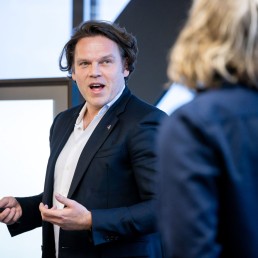
Patrick Schneider-Sakorzky, Partner at Nato Innovation Fund
Pioneering tech on display
Kista was one of only two stops on NIF’s Sweden tour, chosen for its strong ecosystem of deep-tech companies. The visit was part of their broader strategy to identify and invest in dual-use technologies—solutions with applications in both civilian and defence settings. These technologies are key to addressing modern security challenges, from safeguarding critical infrastructure to enhancing resilience against cyber threats.
During the event, 10 Stockholm-based companies presented their solutions. These included technologies in autonomous systems, energy solutions, advanced materials, and next-gen communication technologies. Here’s how three of these companies are driving innovation that could support security and resilience efforts:
Ovzon: Resilient satellite communications
Ovzon presented its advanced satellite system, designed to ensure secure communication in contested environments and enabling multi-domain operations. With features like GPS-denial resilience, ultra-mobile terminals and full sovereign control, Ovzon’s technology supports NATO Innovation Fund’s mission to enhance resilience and build next-generation communication systems. “Secure, reliable communication is critical for defence operations, and our technology addresses those needs, already today in the most demanding environments,” said Per Wahlberg, Deputy CEO of Ovzon.
Papershell: Next-gen lightweight materials
Papershell introduced its biogenic material that is lighter than aluminum, stronger than plastic, and 100% fossil-free. With automated, flexible production in Sweden, it can rapidly scale for applications across industries, ranging from automotive to drone manufacturing. The company’s innovation aligns with NATO Innovation Fund’s focus
on resource sustainment for defence and civil needs. “By using locally sourced input materials, we create a 100% biogenic, fossil carbon-free alternative—proving that sustainability and resilience go hand in hand,” said Anders Breitholtz, CEO of Papershell.
As the company scales production, its goal is to provide one of the market’s cheapest load-bearing materials, making it a cost-effective alternative to traditional composites. This would help member nations reduce reliance on foreign-subsidized materials while significantly cutting emissions.
TeraSi: Compact and secure connectivity solutions
TeraSi showcased its RF modules, capable of securely transferring large volumes of data, even on moving platforms like drones. The compact design and efficiency of this technology directly support NATO Innovation Fund’s goal of advancing secure, deployable communication systems for defence operations. “Connectivity is vital for protecting critical assets, and our solutions make it possible to securely transfer data across domains,” said James Campion, CEO of TeraSi.
With ambitions to enable seamless data transfer across air, space, and terrestrial networks, TeraSi is paving the way for fiber-like connectivity in dynamic environments. Read Dagens Industri’s interview with CEO James Campion to learn more about the company’s advancements (subscription required).
Key takeaways from the event
NATO Innovation Fund’s visit to Kista Science City underscored an important shift: private sector innovation is now a driving force in modern security and defence. As security threats evolve, so must the solutions, and effective collaboration between innovators and defence stakeholders is essential to staying ahead. Here’s what we know:
- Sweden’s NATO membership is unlocking opportunities for its tech industry. Since joining the Alliance in March 2024, Swedish tech companies have new pathways to contribute on a global scale—not only in security and defence but also in strengthening international partnerships and knowledge-sharing across borders.
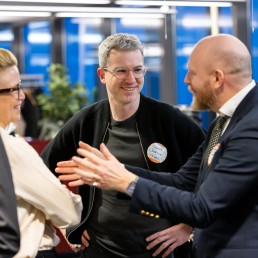
- Bridging private-sector innovation with defence needs is essential. As security challenges evolve, so does the need for cutting-edge solutions—many of which now emerge from the private sector. Stronger collaboration between startups, investors, and defence stakeholders ensures that these innovations are developed, scaled, and deployed where they can have the greatest impact.
- Adaptable technology is key to building resilience in an unpredictable world. Modern security threats are increasingly complex, spanning cyber risks, physical vulnerabilities, and shifting global tensions. To stay ahead, defence and security systems must integrate flexible, dual-use technologies that can evolve alongside emerging challenges.
Our commitment
Sweden’s innovation ecosystem is becoming increasingly connected to the international defence landscape, and Kista Science City is part of that process. We work closely with tech innovators, investors, and global defence stakeholders—helping companies navigate regulatory landscapes, secure funding, and build strategic partnerships that drive meaningful impact.
Do you want to get involved? Reach out to sakarias.strand@kista.com to explore opportunities for collaboration!
Is your business ready to scale globally?
Is your business ready to scale globally?
Sweden offers strong support for early-stage companies focused on commercialising research and technological advancements. However, as businesses grow and prepare to scale into international markets, the range of available support narrows.
Richard Savage, Business Development Specialist at Stream Analyze – a company leveraging edge AI to optimise the management of large automotive fleets – was one of the first companies to join the Scale Hub modules focusing on sales and branding.
“The Scale Hub programme came at exactly the right time for us; it allowed us to stand back and re-evaluate our messaging, our pitch, and our values at the perfect moment in our growth phase. The ScaleHub opportunity appeared just in time for us to run through such important exercises with the right people. I can recommend it highly to anyone lucky enough to receive an invitation to participate.”
To ensure maximum value for participating companies, the programme is modular-based and tailored to meet current, specific needs. Each module is led by carefully selected industry leaders such as Salesonomics, EY Doberman, San Francisco Agency, Potter Clarkson, Synch, TalentX, and others, and consists of half-day workshops that include assignments and follow-up sessions. Furthermore, Scale Hub offers Market Access programmes for the American, British, and German markets that are built on the in-depth modules.
Tatjana Choudhary and Arash Sangari, who are leading the Scale Hub programme, strongly encourage companies to involve both management and team members in the workshops to maximise the benefits. They estimate that participating companies will spend around 25 hours on Scale Hub modules and 20 hours on a Market Access programme.
On 16th October, the British-Swedish Chamber of Commerce, in partnership with Kista Science City and the British Embassy in Sweden, will host AccessUK – a kick-off event for Swedish transformative companies interested in exploring the UK market. Learn more about the event here.
The application window for Scale Hub is open until 9th October, with the first modules starting on 17th October. Arash Sangari emphasises that the programme aims to support transformative companies with global ambitions. Applicants should either have a minimum of 10 employees, have achieved 20% annual growth for three consecutive years, or have successfully raised seed capital.
16 Oct: Intro to Access UK – Evening session on the UK market and what to expect in the on-site program happening in May 2025.
17 Oct: Growth Strategy Workshop with Salesonomics – Build a winning sales plan.
22 Oct: Building Business through Brand & Design with EY Doberman – Leverage brand identity as a growth tool.
6 Nov: Sales Roadmap & Positioning with Salesonomics – Develop a sales strategy to stand out in the market.
- 14 Nov: Strategic PR Workshop with San Francisco Agency – Maximize market presence through strategic communications and matchmaking with tech media.
Until 9th of October companies are able to apply for the Scale Hub programme this autumn, with the first modules starting on 17th of October. Arash Sangari emphasizes that the program aims to support transformative companies with global ambitions. Applicants should either have a minimum of 10 employees, have achieved 20% annual growth for three consecutive years, or have successfully raised seed capital.
Read more about Scale Hub!
